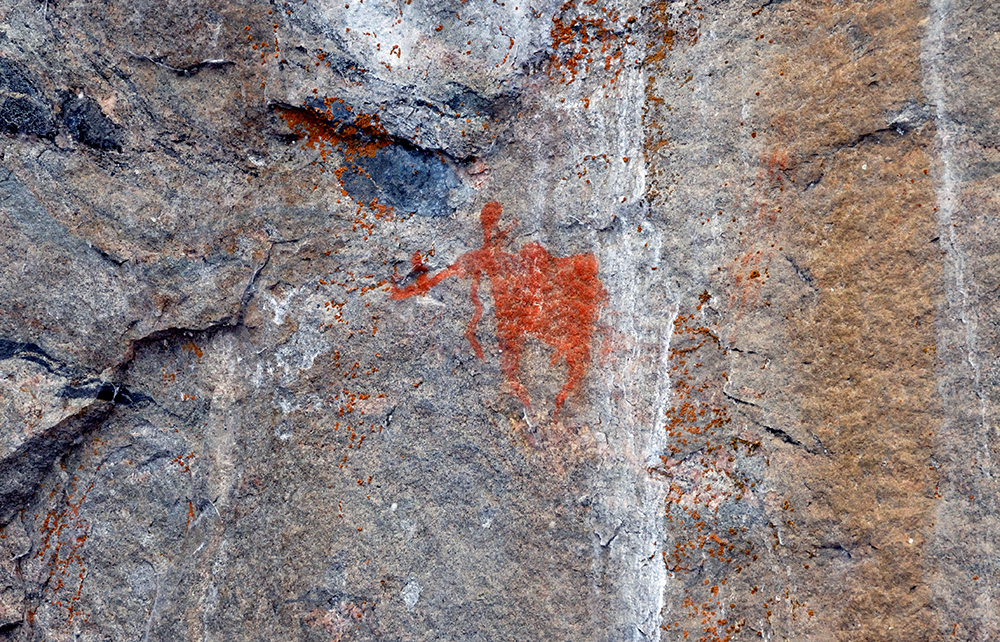Louise Erdrich intrigues with her very first sentence: ‘My travels have become so focused on books and islands that the two have merged for me.’ She explores this integration in her astonishing account of her trips to the lakes and islands of Minnesota and Ontario, where ancient painted signs on rocks inspire her to perceive some islands as ‘books in themselves… You could think of the lakes as libraries.’
There is a productive tension between German logic and Native American spirituality in her refreshingly unusual take on the world: she calls herself a ‘mixed-blood’, born of a German-American father and French-Ojibwe mother. When considering the Ojibwe ritual of offering tobacco to spirits, for instance, she reflects: ‘There was a time when I wondered – do I really believe all of this? I’m half German. Rational!’ Then she explains how she came to realise:
The question whether or not they actually existed became irrelevant… Whenever I offered tobacco, I was for that moment fully there, fully thinking, willing to address the mystery.
She is accompanied on her trip by books (‘I can take home along anywhere in the person of a book, and I do’) and also by her youngest daughter, Kiizhikok, a nursing toddler, who arrived unexpectedly when Erdrich was 47, her other daughters being already teenagers. When she discovered that she’d ‘gone from perimenopausal to violently pregnant’, she was both ‘dazzled’ and ‘struck by the awful burden of it all’. She found ‘a most wonderful consolation’ in books – ‘to read and read while nursing a baby’. She accompanies this statement with a pencil sketch of herself, tenderly holding a book and a baby.
Erdrich is quietly assured in her ability to mother while pursuing her own work. On a boat, she mentions: ‘I have been filming everything I’ve described all along, as well as somehow brandishing a pen and notebook, all the while nursing. One grows used to it.’ Instead of finding this juggle of child and work a near-impossible feat, she perceives men’s unencumbered lives – ‘the way most of them move so freely in the world, without a baby attached’ – as being ‘very strange. Sometimes it is enviable. Mostly it is not.’
This confidence in a mother’s ability is given historical weight when Erdrich writes about women being the first Ojibwe mathematicians, carefully keeping track of the moon to predict the births of their children: ‘Mathematics wasn’t abstract. It was intimate. Dividing and multiplying and factoring were concerns of the body, and of survival.’
The ‘adaptive and powerfully precise’ Ojibwemowin language peppers the book. Erdrich notes that, according to the Guinness Book of World Records, it is one of the hardest languages to learn, owing to the ‘countless’ forms of its verbs, which change depending not just on the relationships among the people doing them, but also according to the precise way the action is conducted, and under what physical conditions. She quotes the vivid example of ‘mookegidaazo… the way a baby looks when outrage is building and coming to the surface where it will result in a thunderous squawl’; and, in sharing the names of plants and their uses, she is adept at demonstrating how Ojibwemowin ‘reflects a human involvement with the spirit of the land itself’. But she admits to frequently falling asleep, brain ‘saturated’, while learning it.
She also notes that the Ojibwe people refuse to say goodbye. ‘Gigaa-waabamin… I’ll see you again’, is as close as the language comes to a final parting. It’s exactly the right thing to say on closing this rich and startlingly original book.






Comments